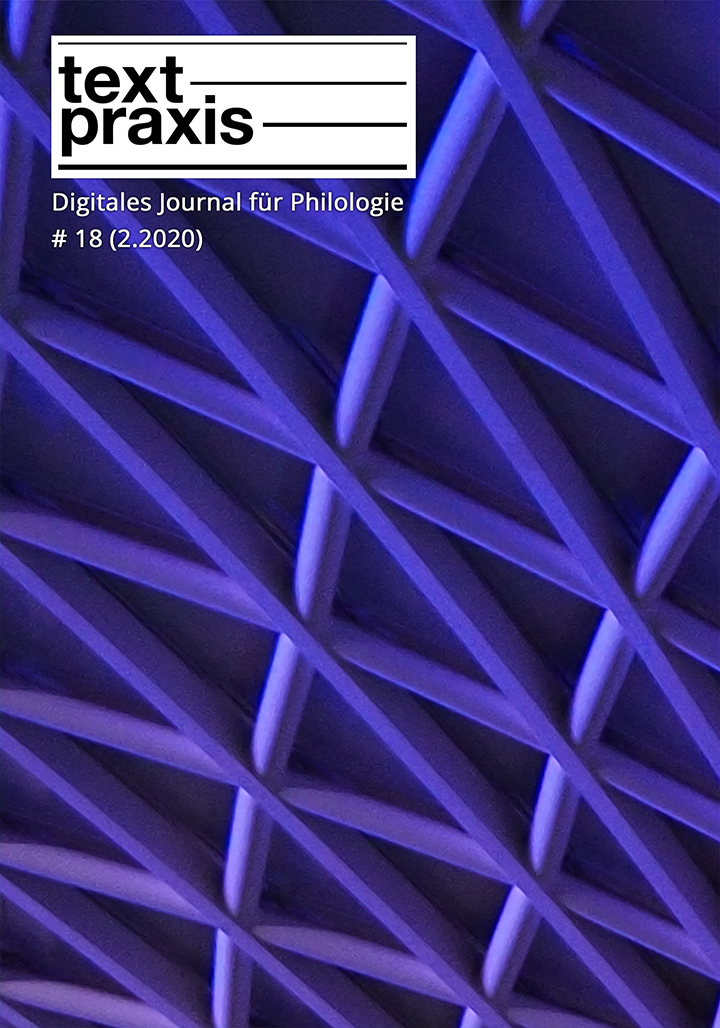Digital Journal for Philology
Invitation to Think
The first volume of Textpraxis was published in November 2010 as the result of almost two years of planning and preparation. At the time, the editorial team consisted of Nina Gawe, Till Huber, Innokentij Kreknin, Christoph Pflaumbaum, Matthias Schaffrick and myself, all of us doctoral candidates at the Graduate School Practices of Literature (GS PoL). Our initial idea was to found a journal that provides an opportunity for publication and discussion for the GS PoL while simultaneously being a practice ground for young academic professionals to learn about academic publishing. Today, 10 years later, I am amazed, astonished and a little bit proud each time the Textpraxis editorial board – which since then consisted of rotating members from various generations of academics – still produces results.
I am astonished because Textpraxis has never been designed to fit the standards for successful philological journals. Textpraxis is “scholar-led” and independent from a publishing house. Textpraxis does not have well-known scholars on its editorial board. And finally, Textpraxis is not a printed journal. We did not make these decisions in the development of the concept out of defiance or pioneering spirit. Rather, we wanted to establish a journal that would be able to support our aims: Visibility for research on the topics of the GS PoL and an inspiring exchange between researchers with different levels of experience, in a format that would be affordable and aesthetically appealing. The best way to achieve this led to the concept that made Textpraxis a pioneer and can still be referenced as best practice: An open access, digital publication, in which dialogue and exchange are the aims that subordinate technical and formatting aspects.
It was only during the developing stages of our concept that we became aware of the principle of open access, and we went through the challenges that came with it “learning by doing”, so to speak. There were, of course, many opportunities to learn: open licensing, long-term-archiving, and permanent accessibility were topics that were dealt with over time and that made Textpraxis gradually become an exemplary undertaking. Many of the innovative elements that Textpraxis already used ten years ago are now standards in the field of open access journals and thus mark our Digital Journal for Philology as a pioneer.
There is, however, also one characteristic of Textpraxis that is not very common yet, but would be an enrichment to other publications: Textpraxis relies on the participation of active and engaged young academic professionals in the editing and publication of the journal, so that work load and attribution of credit coincide. The journal is, in every respect, a collective undertaking. Each new issue demonstrates that by now almost forty editors have successfully passed on their knowledge. From my point of view, this is actually the real strength of Textpraxis: Due to the basic and fundamental concept of collaborative work and open dialogue, Textpraxis opens up possibilities for collaborations in an academic field where success is usually achieved based on personal and individual work. If you do miss this spirit from time to time, I suggest reading the editorial of Textpraxis #1. This basic attitude of openness, enriched through the experiences of the last ten years and the great ideas of forty editors up to now will contribute, surely, to the ongoing enhancing productivity of Textpraxis in the field of philological publications.
Dr. Christina Riesenweber is co-founder of Textpraxis and was a doctoral candidate of the first cohort of the Graduate School Practices of Literature. After working as an editor for academic journals and books, she has been working for the Freie Universität Berlin since 2015, engaging with topics such as open access, open science and organizational development for the university library. She is best contacted via Twitter, @c_riesen, more contact possibilities can be found here: https://www.fu-berlin.de/sites/ub/ueber-uns/team/riesenweber/index.html



Add comment